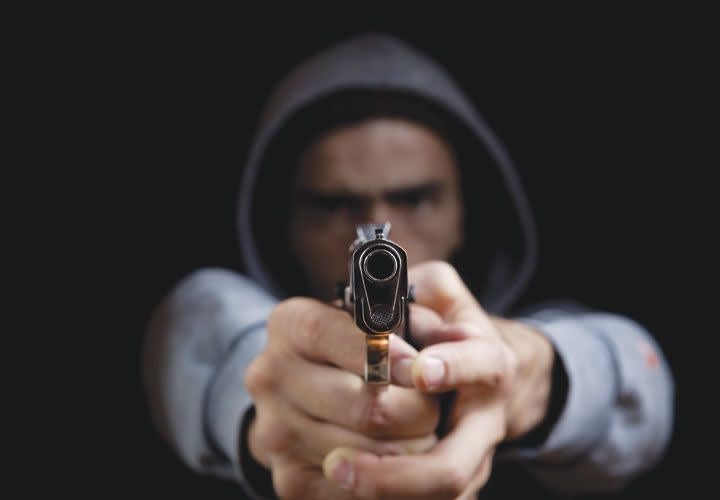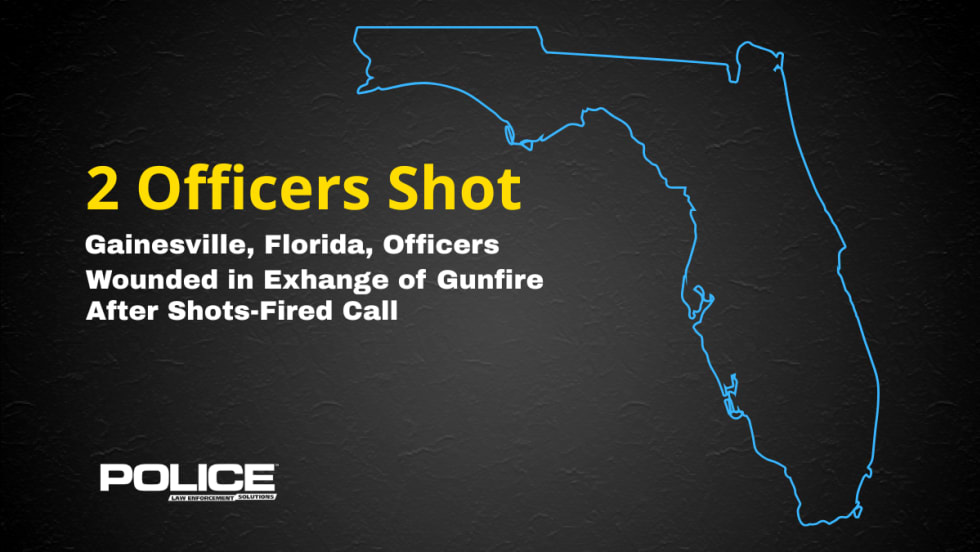The two men continued a rapid fire exchange of rounds, the suspect standing atop the embankment and Reston struggling to move uphill toward him.
Nightclubs and malls in the Jacksonville area routinely hire off-duty officers from the Jacksonville Sheriff's Office for security details. As both officer and agency receive payment, it's a win-win for both in these economically constrained times.
So it came to be that Det. Jared Reston and his partner, Chris Brown, were working security on the evening of Jan. 26, 2008.
The two were sitting in a mall security office when loss prevention officers inside the mall contacted their home base via radio. The loss prevention officers advised that they were about to detain two shoplifting suspects they'd been surveilling just outside the south doors of the mall.
A security supervisor activated a camera monitoring the site of the detention, and Reston and Brown observed the action taking place on the security screen. They watched as a white male and a black male exited the store and were contacted by the loss prevention officers. As soon as loss prevention personnel laid their hands on the white male, a fight broke out.
Darting out of the office, Reston and Brown ran to the location of the fight. The loss prevention personnel had succeeded in getting the white male into custody and were escorting him back inside the mall when they arrived. Indicating the black male, now 50 yards away, the loss prevention crew said that they believed he had stolen something, as well, and asked the officers to detain him.
Foot Pursuit
At the sight of the loss prevention officers pointing toward him, the black male, Joel Abner, 18, ran. Reston and Brown pursued.
Abner dashed across a six-lane expressway of Arlington. Playing dodge car with Saturday evening commuter traffic wasn't the officers' idea of fun, but it was what it was and as Abner continued to another shopping center parking lot, the officers angled through the parking lot to cut him off.
Brown put out their direction of travel over a portable radio. Abner veered right and sprinted along the sidewalk on Atlantic Boulevard. To blend in with the pedestrian crowd, he slowed to a walk.
But Reston wasn't fooled and closed the gap. As Abner's black hooded sweatshirt rounded a corner, Reston drew his TASER and pulled up short of the corner. Slicing the pie, he spotted Abner just as the suspect turned and saw him.
Reston identified himself as a police officer and suggested that it might be in Abner's best interests to stop running.
Abner turned to face Reston and, in an act of seeming compliance, raised his hands in the air. However, Abner continued to walk backward and once he'd succeeded in putting some more distance between himself and Reston, suddenly turned and started to run again.
Reston resumed his pursuit, TASER still in hand. By the time they were in the 9400 block of Atlantic Boulevard, Reston had not only put some distance between his partner and himself but closed the gap with Abner. He yelled a warning of his intent to deploy the TASER, but according to Reston he found the weapon inoperable and reholstered it.
Hands On
By now officer and suspect were at the top embankment of a four-foot-deep dry retention pond. Knowing that he was going to have to go hands on with the suspect, Reston grabbed Abner's hoodie from behind and yanked him toward the ground.
But at 5 feet 10 inches, 210 pounds, Abner had a lower center of gravity than the 6-foot-3-inch Reston and spun around, breaking the detective's grip and punching Reston.
Reston clinched the young man, pulling the suspect's head close to his body and delivering several hard knee strikes to Abner's thigh.
But just as he prepared to take the suspect to the ground, Reston felt something that he'd never felt before.
Knocked for a Loop
For a split second, Reston's field of vision filled with exploding stars. The officer had been in his fair share of fights before, but never had he been knocked for such a disorienting loop as this. As he fell and rolled down the embankment, he knew that something had gone terribly wrong: His jaw collapsed upon itself and he realized that his teeth had canted 45 degrees and were lying sideways in his mouth.
Coming to rest at the foot of the embankment, a stunned Reston looked up to find Abner standing over him and shooting at him with a Glock. As he realized that he'd been shot, the gravity of Reston's situation kicked in-and with it, his will to survive.
Abner started to walk away, turning to fire more rounds at Reston as he did.
But as Reston sat up to retrieve his own Glock 22, Abner realized that the officer was still in the fight. In a poor substitute for tactics but an aggressive concession to distance, Abner stalked back toward Reston, his finger still squeezing the trigger.
Pain seared Reston's left leg and right buttock as he tried to stand. His dazed head and compromised equilibrium made target acquisition difficult, but each time the front sight of his pistol picked up the suspect's torso, the detective squeezed off another shot.
With but a few feet separating them, the two men continued a rapid fire exchange of rounds, the suspect standing atop the embankment and Reston struggling to move uphill toward him.
Just as Reston got some traction on the embankment, Abner staggered. Seizing the man, Reston pulled him down next to him.
Pointing his Glock at the man's head, Reston fired-three point blank shots in rapid succession. One Ranger SXT 180-grain bullet tore into the back of the suspect's head; another bore into his cheek; a third entered Abner's mouth.
Abner went limp.
Pushing the man's body into a culvert with his feet to put some distance between himself and Abner, Reston covered the suspect with his Glock until Brown arrived.[PAGEBREAK]
Transported
Units had already started rolling when Brown made an emergency broadcast. Now, Reston keyed his own mic and spoke as well as he could with a broken jaw that there was an officer down.
Darkness was falling with the only illumination of the culvert from streetlights: Neither officer could get a good view of Abner. As cautiously as possible, Brown made a tactical approach of the culvert. Finding Abner deceased, Brown turned his attentions to his downed partner.
Reston was subsequently transported to Shands Jacksonville Medical Center. Lying on the gurney, Reston spit crimson globs of the blood that was pooling inside his mouth. It gave him something to focus on and to keep himself conscious.
He'd just won one fight, and wanted to make sure that he'd still be around to fight another.
Wounds and Recovery
Reston survived. But having three quarters of his jaw blown away proved a life changing event for the detective. His jaw was wired shut for nine weeks before the first surgery. Today, he still has scars from the exit wounds on his neck and chin, but the surgeons reconstructed his face well.
Among the numerous procedures that Reston had to endure were two surgeries just to clear infections in his neck. Rehab to his leg and ribcage went well. His butt hurt like hell and he couldn't walk, but the wound was fine. He spent some time home nursing, replacing packing and bandages three times a day. Doctors used bone from his hip and plates to pin his jaw in place. He still wears braces and may face additional corrective surgeries. He lost five teeth because of the shooting and nerve damage has caused numbness in his lower jaw. He lives with pain in his legs and buttocks.
Throughout the quarter-mile foot pursuit, Reston had watched Abner's movements, anything that might hint at any danger above and beyond the youth's being a shoplifter. But there'd been nothing, no tell-tale reach for the waistband, nothing to make Reston's hair stand on end during the foot chase.
Looking back, Reston believes the gun may have been hidden in the front pocket of the suspect's hoodie. In hindsight, he believes that Abner was working up a resolve to kill well before the foot pursuit:
Security footage from the mall shows Abner repeatedly approaching mall security with his hands in his front pockets, then retreating, as if building up courage to attack them.
As it was, Reston never heard the first shot. He'd seen a disorienting flash, but nothing demonstrably different than when he'd taken it on the chin in fights before. It wasn't until he'd fallen that he realized that he'd been shot.
That round turned out to be the first of 13 bullets fired by Abner in the wannabe gangster's attempt to make the grade as a bad ass.
It wasn't for lack of effort that he failed in his attempt to kill Reston. The officer was struck a total of seven times. One bullet entered his left thigh and exited near the hip. One to his chin, exited out his neck. One to his left buttock, lodged next to his hip. One hit his right elbow. And three across his chest were stopped by his American Body Armor (Safariland) Xtreme XT body armor. One of the chest shots hit the armor plate on the center of Reston's chest, which he didn't feel at all. One shot to his ribs left a bruise, but both would have been fatal without the armor.
Reston says that while some veteran officers on his department forego wearing a vest, he makes it a habit to wear one anytime he is uniform, whether working on-duty or in an off-duty capacity, such as the day he was at the mall.
Hits and Misses
For his part, Reston fired 14 rounds, striking Abner seven times. One round hit Abner in the right shoulder; another, his right thigh before tearing into his stomach. One hit the suspect's back and traveled out the shoulder, while another traversed up through the ribcage before severing an artery in Abner's neck. Reston believes this shot may have been the round that caused Abner to fall toward him.
The incident lasted about 90 seconds, with the firefight comprising a mere five seconds of that span.
This was not Det. Reston's first shooting, and he feels that his prior experience helped him respond more assuredly in this situation. Whereas he'd experienced tunnel vision during his first shooting, during the Abner shooting everything played out without any demonstrative impact on his senses, save for a lack of ringing in his ears in its aftermath. It was as though his mind was registering everything accurately and processing it accordingly.
That's not to say there wasn't an added dimension this time, though. For as soon as Reston realized that he'd been seriously injured, he got pissed off. Not to the point of blind rage, but to a level where his adrenaline worked for him. He knew that he needed to end this firefight as soon as possible before he was fatally wounded. If he could move, think, and return fire, he was going to stay in the fight.
Reston counts a great many factors as having come into play in his surviving the incident, not the least of which was his ballistic vest. He is also thankful for his training, mental conditioning, and prior experience. But even his physical conditioning had paid off in unanticipated ways.
Reston's excellent physical conditioning-honed by a natural desire to stay in shape as well as the obligations imposed by his SWAT training-helped prevent Reston suffering even greater injuries. The bullet that traveled up his leg passed along a path of least resistance, paralleling alongside the sinews of muscle before terminating in a non-threatening portion of his body. That same muscle mass helped to slow down the bullets once they entered his body, and likewise helped to minimize the pain he would have otherwise felt. It also factored considerably in his body's ability to heal and be rehabilitated.
"Working out, you have to condition yourself to come out of this type of situation alive," Reston says. "It happens all the time. I trained at the range on my own time, developed a warrior mindset. You can't sit back and hope that something never happens to you.
"I always planned for the possibility of one day getting shot and how I would respond, how I would react on the radio. Dispatch isn't going to come through the line to help you. You've got to do what you've got to do."
Among the many awards and recognitions Det. Jared Reston received for his heroic actions that day: The State of Florida Law Enforcement Officer of the Year; the National Police Hall of Fame and Museum National Officer of the Year; and Jacksonville Sheriff's Office Officer of the Year. He continues to serve Jacksonville County.













